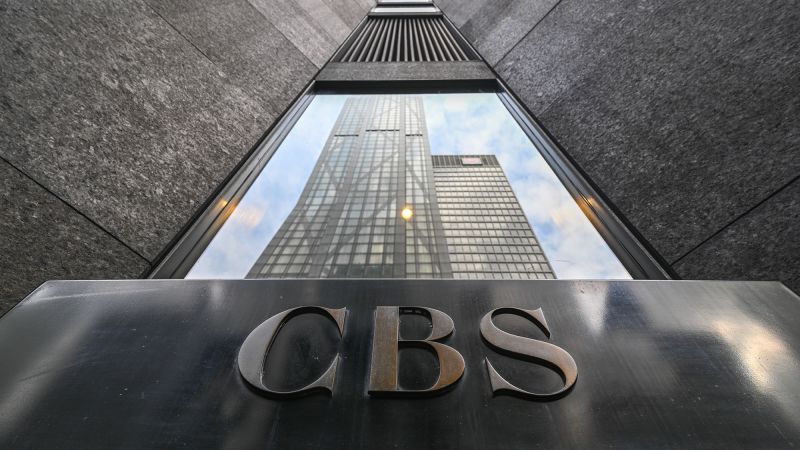CBS News parent Paramount Global has agreed to pay $16 million to resolve a legally dubious lawsuit filed by President Donald Trump over a “60 Minutes” news report last fall.
The long-gestating and highly controversial settlement payment was announced by Paramount late Tuesday night.
Paramount said the $16 million sum “includes plaintiffs’ fees and costs,” and will not be paid to Trump directly, but instead will be allocated to Trump’s future presidential library — mirroringa settlement agreementthat Disney’s ABC struck with Trump last December.
“The settlement does not include a statement of apology or regret,” Paramount specified.
The announcement also said that “in the future, ‘60 Minutes’ will release transcripts of interviews with eligible U.S. presidential candidates after such interviews have aired, subject to redactions as required for legal or national security concerns.”
Legal experts maintained that Trump’s suit was frivolous and that CBS was on solid ground to fight and win the case in court.
But corporate priorities trumped journalistic principles. Paramount has been trying for months to complete a lucrative merger with Skydance Media, and the deal requires approval from the Trump administration, in part because CBS owns local stations that are licensed by the government.
This gave Trump a form of leverage over Paramount — and may have put more pressure on the company to pay up.
Paramount said Tuesday night that “this lawsuit is completely separate from, and unrelated to, the Skydance transaction and the FCC approval process. We will abide by the legal process to defend our case.”
FCC chair Brendan Carr has also repeatedly said that his merger review process is separate. But before being promoted to chairman, the Trump appointee said complaints over the “60 Minutes” edit would be “likely to arise” as part of the FCC’s merger review.
Outside analysts, including a number of prominent press freedom groups, said the public should see past the official statements and recognize the alarming nature of Paramount’s payoff to Trump.
“Everyone knows the case is not worth $20 million, or even 20 cents, in terms of legal merit,” the Freedom of the Press Foundationsaid last week. “It’s beyond frivolous — and that’s saying something given the myriad frivolous lawsuits Trump has filed.”
Trump filed the lawsuit before winning reelection. His complaint was about a single question and answer in a lengthy “60 Minutes” interview with then-Vice President Kamala Harris. He claimed without evidence that the Harris exchange was deliberately edited to benefit the Democratic candidate and hurt him.
Conservative media watchdogs hadnoticedthat CBS aired two different soundbites from Harris in response to correspondent Bill Whitaker’s question about the Biden administration’s relationship with Israel amid the war in Gaza. One clip aired on “Face the Nation” and another clip aired on “60 Minutes,” which generated confusion on the part of the viewing public.
As criticism mounted and Trump threatened to sue, CBS said it merely edited the vice president’s answer for time, in accordance with television news standards, and it declined to release the full transcript.
Trump went on the warpath, claiming “election interference” and calling it “the biggest scandal in broadcast history.” He accused CBS News of violating a Texas consumer protection law and demanded $10 billion in damages. His lawyers later raised the total to $20 billion.
Legal experts slammed the suit as “frivolous and dangerous,” and CBS defended “60 Minutes” on First Amendment grounds.
Under pressure from the FCC last winter, CBS released the tapes and transcript of the interview, and the raw materials confirmed that it engaged in normal editing, not any nefarious activity like Trump alleged.
Nevertheless, the lawsuit posed a serious problem for Paramount, especially its controlling shareholder, Shari Redstone, who stands to make hundreds of millions of dollars through the Skydance deal.
So once Trump took office for a second term, Paramount executives sought to make the lawsuit disappear by pursuing a settlement. Critics of the effort, inside and outside CBS, used words like payoff and bribe to describe the proposed settlement.
At “60 Minutes,” “everyone thinks this lawsuit is an act of extortion, everyone,” a network correspondenttold CNNearlier this year.
Several Democratic lawmakers even raised concerns that a settlement might run afoul of anti-bribery laws. The media company seems to be sidestepping those concerns by paying the same amount as Disney.
Trump’s CBS lawsuit was part of his larger and ongoing effort to attack major media organizations he deemed unfavorable to him. Hesued The Des Moines Registerand pollster J. Ann Selzer last December over a pre-election survey that showed Harris leading Trump in Iowa, which he ultimately won by double digits. Trump claimed the poll violated consumer fraud protections; the Register is currently fighting the suit in court.
He alsosued ABC News, alleging that anchor George Stephanopoulos defamed him, and the networkultimately settledthat case, creating a blueprint of sorts for the Paramount agreement.
In recent months, the CBS newsroom has been consumed by Trump’s pressure, the prospect of a settlement and the corporate maneuvering aimed at securing the merger’s approval.
That internal strife spilled out into the public view in late April when “60 Minutes” executive producer Bill Owens resigned,citing a loss of editorial independence. Days later, “60 Minutes” correspondent Scott Pelleycalled out Paramount on-air, revealing that executives “began to supervise our content in new ways” amid the pending merger. “No one here is happy about it,” he said.
A month later, Wendy McMahon, the executive in charge of CBS News, alsoresigned. She alluded to a “challenging” past few months in her farewell memo to employees, adding that “It’s become clear that the company and I do not agree on the path forward.”
All the while, “60 Minutes” kept producing substantive investigations about Trump and other subjects, including a probe ofhis efforts to punish law firmshe dislikes.
